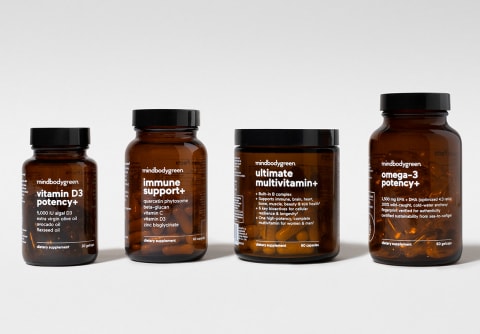Advertisement
Take On Your Fitness Goals With The Support Of Vitamin D — Here's How



The holiday season is coming to an end, and 2022 is right around the corner—which means many of us are evaluating our current health habits and finding ways to improve or maintain our overall well-being in the new year.
Perhaps you've been prioritizing socializing with family and friends over hitting the gym (good for you—you deserve a break!). Or maybe you've been rushing around to finish holiday errands and struggled to find even 10 minutes on your yoga mat this past month (trust us, we've been there).
For some, the new year can seem a bit daunting, especially when it comes to exercising. Many people are excited to start their new fitness routine, but the motivation fades after a couple of weeks or months. But what if I told you there's a nutrient that can support your muscles so they're able to operate at their best as you take on your new health goals?* Enter: vitamin D3.
The science on vitamin D and muscle health.
You've probably heard about vitamin D's role in bone health and calcium absorption by now, but vitamin D's broader role in musculoskeletal health is still a fresh topic in the science world (i.e., research is still ongoing). What we do know is that vitamin D receptors (VDR) have been found in skeletal muscle (aka the muscles surrounding your bones that aid movement), clearly indicating that vitamin D plays a vital part in maintaining and directly supporting muscle form and function.*
For starters, you need sufficient vitamin D throughout your lifetime to maintain a healthy percentage of muscle mass (the total amount of skeletal, smooth, and cardiac muscles in your body).* In terms of health benefits, higher muscle mass can support everything from metabolism to slowing down muscle loss with age and even longevity.*
Lucky for us, evidence shows that vitamin D supplementation greatly improves muscle mass for individuals deficient or insufficient in the essential vitamin—29% and 41% of U.S. adults1, respectively.* Vitamin D also has the ability to improve muscle function for those deficient in the essential vitamin.*
With the overwhelming majority of the American population consuming wholly inadequate amounts of this essential micronutrient, it's safe to say that D3 supplementation can support muscle health for quite a few.*
Reaching truly optimal vitamin D levels.
According to nutrition musculoskeletal scientist Christian Wright, Ph.D., there is one caveat to the research surrounding muscle health. "Overall, the majority of data suggests vitamin D supplementation is beneficial for muscle function, mass, and metabolism—if vitamin D status is low or deficient,"* says Wright. "After vitamin D status is sufficient, however, there appears to be little to no clinically significant benefit of additional vitamin D supplementation."
"Since almost half of the U.S. population is not vitamin D sufficient, and many of us are yo-yo'ing in and out of sufficiency, challenge accepted," says Ashley Jordan Ferira, Ph.D., RDN, mbg's director of scientific affairs. As a reminder, your serum total 25-hydroxyvitamin D (25[OH]D) is measured with a blood test, and anything above 30 ng/ml is considered "sufficient."
As nutrition scientist Ferira previously shared, "I personally don't like to confuse folks by even mentioning 30 ng/ml in the same breath as 'vitamin D sufficiency.' I prefer to think of 30 as the risk or warning zone. It's the cutoff for inadequacy, so you don't strive for it, you avoid it with intention."
So, what is the optimal serum 25(OH)D level to strive for? While hitting 30 ng/ml is certainly a start, the true goal for optimal health benefits and support is 50 ng/ml (and here's the tool many experts recommend to get there).* In case you were wondering, getting too much vitamin D isn't really a thing, either.
The bottom line.
No matter how you're approaching the new year or considering adding movement to your regular routine, we commend you for making an intention to be a little more active in 2022! And if you're using your muscles in a more purposeful way, why not support their form and function by adding a sustainable, high-quality vitamin D supplement to your daily nutrition ritual?*
mindbodygreen's vitamin D3 potency+ is a high-potency (5,000 I.U.), bioavailable formula with plant-origin (organic algae) vitamin D3 and innovative, built-in absorption technology (i.e., a trio of organic oils from flaxseed, avocado, and olives that support the absorption of fat-soluble vitamin D). Just one softgel a day will promote lifelong vitamin D sufficiency and muscle health.*

